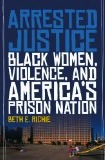 Beth Richie, a professor of African American studies and gender and women’s studies at the University of Illinois at Chicago has written a new book focusing on the impact on women in poverty neighborhoods of high incarceration rates among Black men. The book, Arrested Justice: Black Women, Violence, and America’s Prison Nation (New York University Press, 2012), states that harsh sentencing for Black men, combines with gender dynamics in Black neighborhoods to propel some women into violent relationships and crime.
Beth Richie, a professor of African American studies and gender and women’s studies at the University of Illinois at Chicago has written a new book focusing on the impact on women in poverty neighborhoods of high incarceration rates among Black men. The book, Arrested Justice: Black Women, Violence, and America’s Prison Nation (New York University Press, 2012), states that harsh sentencing for Black men, combines with gender dynamics in Black neighborhoods to propel some women into violent relationships and crime.
“While the impact on men is clear,” Dr. Richie states, “there are also significant ways that women experience the negative effects of the prison nation, especially those women who also experience gender violence. There is a new level of disdain toward Black women who are young, poor, queer, or living in vulnerable circumstances. The more stigmatized their social position, the easier it is to victimize them.
Professor Richie concludes, “When America’s prison nation is understood to be the backdrop for male violence against Black women, a new formulation of anti-violence politics will emerge.”
Dr. Richie is a graduate of Cornell University. She holds a master of social work degree from Washington University in St. Louis and a Ph.D. in sociology from the City University of New York.


It is devastating to the whole community. The mothers left to raise children, the women left without mates for aging together, grandmothers left to raise grandchildren because both mother and father are in prison. Or mothers drop out of responsibility out of shear inability to withstand the pain and weight of it all. Women left to take full responsibility for the whole community at large, thus creating programs to assist themselves in recovering from the loss. The PTSD from the long term trauma of neglect, violence, poverty, hunger, homelessness, drugs, crime, witness of murders; all perpetuates for a life time. Thus giving stagger stats of dual diagnoses, multitudes of chronic diseases from the extreme stress. The nightly summation is a sound late at night, like the wailing at the wall or that age old moan by the sea watching the ships sail away with our best in toll, hoping and praying God hears and sends a surrogate Messiah. Been there done that, there’s still a painful sting, like salt on a wound when not looking, a memory sneaks in between the doctoral philosophy and that every day sista thoughts when drifting off to sleep, whispering PEACE BE STILL, ALWAYS LOYAL, I HOLD UP 1/2 THE SKY…